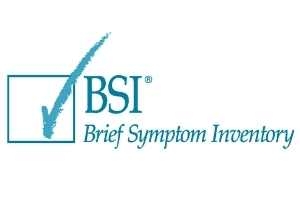Author:
Leonard R. Derogatis, PhD
Age Range:
Individuals 13 years and older
Administration:
Paper-and-pencil, CD, or computer administration
Scoring Option:
Q-global™ Scoring & Reporting, Q™ Local Software, Mail-in Scoring Service, and Manual Scoring
Completion Time:
8–10 minutes (53 items; 5-point rating scale)
Norms:
Adult nonpatients, Adult psychiatric outpatients, Adult psychiatric inpatients, Adolescent nonpatients
Telepractice:
Tips on using this test in your telepractice
Report Options:
Interpretive, Profile, and Progress Reports
Publication Date:
1993
The efficient Brief Symptom Inventory (BSI) instrument provides patient-reported data to help support clinical decision-making at intake and during the course of treatment in multiple settings.
We also distribute the BSI® 18 test.
How to Use This Test
Psychologists, psychiatrists, physicians, nurses, and other healthcare professionals can use the BSI instrument to help:
- Assess patients at intake for psychological problems
- Objectively support care management decisions
- Measure patient progress during and after treatment to monitor change
- Provide coutcomes measurement for treatment programs and providers through aggregated patient information
Key Features
- The BSI test is brief and requires only 8-10 minutes to complete, making it well-suited for repeated administrations over time to evaluate patient progress.
- The BSI instrument provides an overview of a patient’s symptoms and their intensity at a specific point in time.
- The Global Severity Index (GSI) is designed to help quantify a patient’s severity-of-illness and provides a single composite score for measuring the outcome of a treatment program based on reducing symptom severity.
- The reliability, validity, and utility of the BSI instrument have been tested in more than 400 research studies.
Scales
Symptom Scales
SOM – Somatization
O-C – Obsessive-Compulsive
I-S – Interpersonal Sensitivity
DEP – Depression
ANX – Anxiety
HOS – Hostility
PHOB – Phobic Anxiety
PAR – Paranoid Ideation
PSY – Psychoticism
Global Indices
GSI – Global Severity Index, Helps measure overall psychological distress level
PSDI – Positive Symptom Distress Index, Helps measure the intensity of symptoms
PST – Positive Symptom Total, Reports number of self-reported symptoms
Psychometric Information
Adult Nonpatient
The adult nonpatient norms are based on 974 individuals—494 males and 480 females. Approximately 85% of the sample was white and 60% was married. The mean age was 46.
Adult Psychiatric Outpatient
The adult psychiatric outpatient norms are based on 1,002 individuals—425 males and 577 females. Approximately 67% of the sample was white and 46% was single. The mean age was 31.2.
Adult Psychiatric Inpatient
The adult psychiatric inpatient norms are based on 423 individuals—158 males and 265 females. Approximately 56% of the sample was white and 44% was single. The mean age was 33.1.
Adolescent Nonpatient
The adolescent norms are based on 2,408 individuals—1,601males and 807 females. The data were gathered in six separate schools in two states. Approximately 58% of the sample was white, and the mean age was 15.8.
Report Options
Profile Report (Product Number 51451)
Presents raw and normalized T scores for each of the nine Primary Symptom Dimensions and the three Global Indices. For adults, the plotted T scores are profiled based on your choice of the nonpatient, outpatient or inpatient norms. (The T scores for the remaining norm groups are printed below the profile.) For adolescents, the plotted T scores are based on the adolescent nonpatient norms.
View a sample Profile Report.
Interpretive Report (Product Number 51457)
In addition to providing a profile of scores for the nine Primary Symptom Dimensions and the three Global Indices, the interpretive report provides a narrative overview of the client’s symptoms at the global level and specific statements describing the individual symptom scale scores. In addition, it includes a Symptoms of Note section that lists all items for which the client chose the “extremely distressed” or “quite a bit distressed” response. These statements can be valuable for understanding the individual’s current status and for use by the clinician in follow-up interviews.
View a sample Interpretive Report.
Progress Report (Product Number 51433)
This report is designed for monitoring a client’s progress over time. Provided at no additional charge, it graphically displays scale-by-scale changes in a client’s scores for up to five previously reported BSI administrations. The progress report is based on nonpatient norms.
View a sample BSI Progress Report.
Scoring Options
Q-global™ Web-based Administration, Scoring, and Reporting – Enables you to quickly assess and efficiently organize examinee information, generate scores, and produce accurate comprehensive reports all via the Web.
Q™ Local Software – Enables you to score assessments, report results, and store and export data on your computer.
Mail-in Scoring Service – Specially designed answer sheets are mailed to us for processing within 24–48 hours of receipt and returned via regular mail.
Manual Scoring – Administer assessments on answer sheets and score them quickly yourself with an answer key.
Pre-recorded Webinars
-
SCL-90-R and BSI Tests: The Derogatis Checklist Series
Presenter: Leonard R. Derogatis, PhD
Learn how you can better serve your client’s needs and expand your practice with the use of the Derogatis Checklist Series. Dr. Derogatis, a global authority on symptom checklists and outcomes measurement and author of the SCL-90-R, BSI, and BSI 18 tests, will present a free webinar on the history, design, and application of these respected instruments. Quick and easy to administer, the Derogatis Checklist Series is widely used in a variety of settings, including clinical practice, medical settings, and clinical trials.
Date: Nov 15, 2017
 PDF: SCL-90-R and BSI Tests: The Derogatis Checklist Series
PDF: SCL-90-R and BSI Tests: The Derogatis Checklist Series
 Video: SCL-90-R and BSI Tests: The Derogatis Checklist Series
Video: SCL-90-R and BSI Tests: The Derogatis Checklist Series
-
SCL-90-R and BSI Tests: The Derogatis Checklist Series
Presenter: Dr. Leonard R. Derogatis
Learn how you can better serve your client’s needs and expand your practice with the use of the Derogatis Checklist Series. Dr. Derogatis, a global authority on symptom checklists and outcomes measurement and author of the SCL-90-R, BSI, and BSI 18 tests, will present a free webinar on the history, design, and application of these respected instruments. Quick and easy to administer, the Derogatis Checklist Series is widely used in a variety of settings, including clinical practice, medical settings, and clinical trials.
Date: Oct 12, 2016
 PDF: SCL-90-R and BSI Tests: The Derogatis Checklist Series
PDF: SCL-90-R and BSI Tests: The Derogatis Checklist Series
 Video: SCL-90-R and BSI Tests: The Derogatis Checklist Series
Video: SCL-90-R and BSI Tests: The Derogatis Checklist Series
-
SCL-90-R and BSI Tests: The Derogatis Checklist Series
Presenter: Dr. Leonard R. Derogatis
Learn how you can better serve your client’s needs and expand your practice with the use of the Derogatis Checklist Series. Dr. Derogatis, a global authority on symptom checklists and outcomes measurement and author of the SCL-90-R, BSI, and BSI 18 tests, will present a free webinar on the history, design, and application of these respected instruments. Quick and easy to administer, the Derogatis Checklist Series is widely used in a variety of settings, including clinical practice, medical settings, and clinical trials.
Date: May 28, 2015
 PDF: SCL-90-R and BSI Tests: The Derogatis Checklist Series
PDF: SCL-90-R and BSI Tests: The Derogatis Checklist Series
 Video: SCL-90-R and BSI Tests: The Derogatis Checklist Series
Video: SCL-90-R and BSI Tests: The Derogatis Checklist Series
-
The Derogatis Checklist Series: SCL-90-R, BSI, and BSI 18
Presenter: Leonard Derogatis
Learn about how you can better serve your client’s needs and expand your practice with the use of the Derogatis Checklist Series. Dr. Derogatis, a global authority on symptom checklists and outcomes measurement and author of the SCL-90-R®, BSI®, and BSI 18 tests, will present a free webinar on the history, design, and application of these respected instruments. Quick and easy to administer, the Derogatis Checklist Series is widely used in a variety of settings, including clinical practice, medical settings, and clinical trials.
Date: May 11, 2011


Questions
Frequently asked questions follow. Click on a question to see the response.
-
Do any of the BSI reports contain all of the normative groups?
-
How can I find out the statistical relationships between the BSI test and SCL-90-R assessments?
-
Is the BSI available in other languages?
-
What is the difference between the SCL-90-R assessment and the original SCL-90 assessment?







